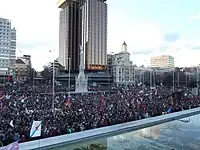| |||||
| Decades: |
| ||||
|---|---|---|---|---|---|
| See also: | Other events of 2014 List of years in Spain | ||||
Events of 2014 in Spain
Incumbents
- Monarch: Juan Carlos I (abdicated 19 June), Felipe VI[1]
- Prime Minister: Mariano Rajoy
Regional presidents
- Andalusia: Susana Diaz
- Aragón: Luisa Fernanda Rudi
- Asturias: Javier Fernandez
- Balearic Islands: José Ramón Bauzá
- Basque Country: Iñigo Urkullu
- Canary Islands: Paulino Rivero
- Cantabria: Ignacio Diego
- Castilla–La Mancha: María Dolores de Cospedal
- Castile and León: Juan Vicente Herrera
- Catalonia: Artur Mas
- Extremadura: José Antonio Monago
- Galicia: Alberto Núñez Feijóo
- La Rioja: Pedro Sanz
- Community of Madrid: Ignacio Gonzalez
- Region of Murcia: Ramón Luis Valcárcel (until 10 April), Alberto Garre (starting 10 April)
- Navarre: Yolanda Barcina
- Valencian Community: Alberto Fabra
- Ceuta: Juan Jesús Vivas
- Melilla: Juan José Imbroda
Events
January

March for Dignity in Plaza de Colón, Madrid
- 3 January – the 75th anniversary of the Agencia EFE.
- 7 January – The infanta Cristina of Spain is charged by the judge hearing the Nóos case, with money laundering and tax crimes.[2][3]
- 11 January – About 110,000 people march peacefully through Bilbao, demanding Basque independence and freedom for more than 600 ETA prisoners.[4][5]
February
- 20 February – 20: Statements made by actor Javier Bardem in Paris during the presentation of a documentary produced by him on the human rights situation in Western Sahara causes a diplomatic row between France and Morocco.
March
- 11 March – the 10th anniversary of the 2004 Madrid train bombings
- 22 March – 101 people are injured and 29 arrested after an anti-austerity march turns violent in Madrid.
June
- 2 June – King Juan Carlos announces his intention to abdicate, after nearly 39 years on the throne. His son Felipe, Prince of Asturias, is to succeed him.[6][7] The announcement of the pending abdication is followed by large anti-monarchy demonstrations in Madrid and Barcelona.
- 19 June – King Juan Carlos I abdicates in favour of his son, King Felipe VI. Felipe is enthroned at the Congress building in Madrid, in a ceremony that does not include coronation. He then travels with his family to the Royal Palace in a Rolls-Royce and appears on the balcony to wave to crowds.[8]
July
- 9 July – France denies having amended its penal policy by moving 2 ETA convicts to the prison in Mont-de-Marsan; closest to the Basque Country, which was their main region of operation.
November
- 9 November – The Catalan people vote in a referendum on whether and how they should exercise self-determination. The unionist government in Madrid does not recognise the authority of the vote.
- 18 November – UNESCO declares the Camino de Santiago of Spain as a World Heritage Site in Danger.
Deaths
- 1 February – Luis Aragonés, 75, footballer and manager
- 25 February – Paco de Lucía, 66, flamenco composer, guitarist and producer
- 23 March – Adolfo Suárez, 81, 138th Prime Minister of Spain
See also
References
- ↑ "Profile: Spain's King Felipe VI". BBC News. Retrieved 29 August 2023.
- ↑ Manresa, Andreu (8 January 2014). "La Infanta, imputada por segunda vez". El País (in Spanish). ISSN 1134-6582. Retrieved 1 December 2020.
- ↑ "Spain's Princess Cristina tried for fraud". BBC News. 11 January 2016. Retrieved 1 December 2020.
- ↑ "110,000 march in Spain's Basque country". SBS. 12 January 2014.
- ↑ "Huge march in Spain after ban on ETA prisoner rally". BBC News. 11 January 2014.
- ↑ Fiona Ortiz (2 June 2014). "Spain's King Juan Carlos abdicates". Reuters.
- ↑ "King Juan Carlos of Spain abdicates". BBC News. 2 June 2014.
- ↑ "King Felipe VI calls for 'new Spain' as he is sworn in", BBC News Archived 5 September 2018 at the Wayback Machine. Accessed 19 June
This article is issued from Wikipedia. The text is licensed under Creative Commons - Attribution - Sharealike. Additional terms may apply for the media files.
